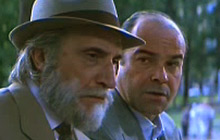
When Andrés Vicente Gómez proposed
that I direct the movie, the script had already been written. I am
acquainted with Miguel Delibes works, but I hadn't read "Diario de
un jubilado" (Diary of a Retired man). After accepting Andrés's
offer, I read that book by Delibes and wrote some notes as if I
myself had been in charge of writing the screen adaptation of the
novel. Then, I read the script by Rafael and realized that there
were many common points between what Rafael and I had written.
The most important change in the
movie from the book is in the age of the leading character,
Lorenzo, who in the novel is about sixty and whom we turn into an
unemployed man about twenty years younger, with all the differences
that this implies - marriage, his friends, etc [...]
It is a provincial story with an
atmosphere and characteristics that are very difficult to be found
in big cities like Madrid or Barcelona. For instance, the character
whose role is played by Saza: a poet who is known by his neighbors
and to whom probably some day the name of a street or a statue
might be devoted - in reality a mediocre man - can only be
explained within that provincial context.
On the other hand, as in the case
of Azcona, I like the black and sarcastic sense of humor. If "Una
pareja perfecta" (A perfect Couple) isn't exactly a choral film -
in the sense that many secondary characters intervene in the action
- as far as its characters are concerned, it is in terms of the
different issues that are touched upon. I think we are talking
about a story of loneliness and friendship in which the characters
improve as it unfolds. Filmmaker Berlanga used to say that his
characters always ended up being worse than at the beginning of his
films. In this case, by contrast, I think they improve, at least as
regards having values, which are very important, like tolerance -
in the case of the character whose role is played by Resines - and
in terms of getting to know themselves better.
FRANCESC BETRIU.